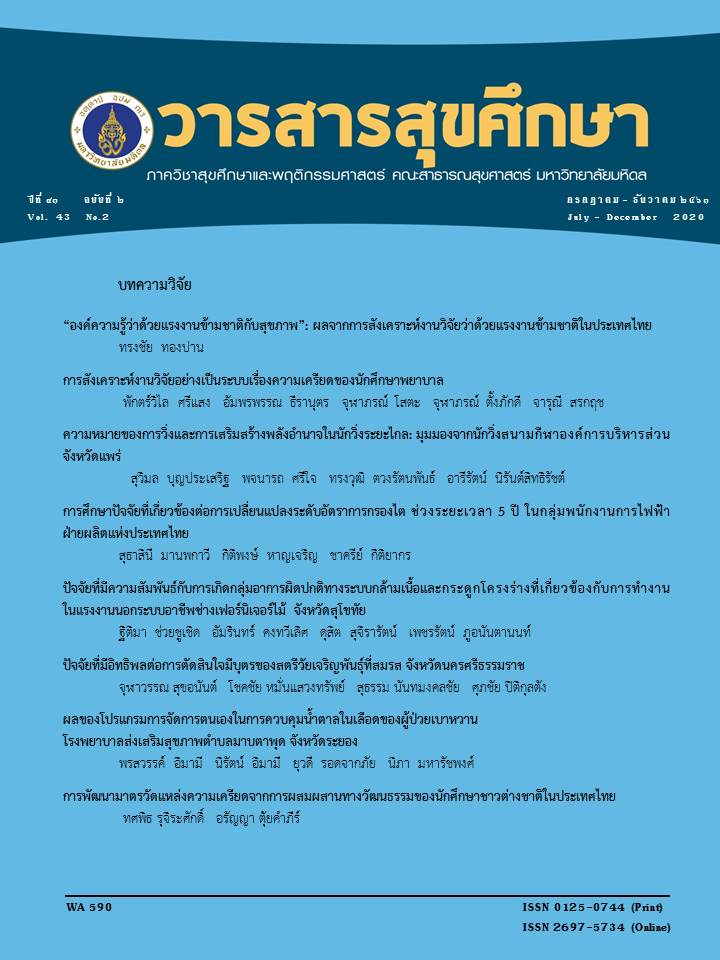การพัฒนามาตรวัดแหล่งความเครียดจากการผสมผสานทางวัฒนธรรมของนักศึกษาชาวต่างชาติในประเทศไทย
คำสำคัญ:
แหล่งความเครียด, การผสมผสานทางวัฒนธรรม, นักศึกษาชาวต่างชาติบทคัดย่อ
การมุ่งสู่ความเป็นนานาชาติในการศึกษาอุดมศึกษาของประเทศไทยเติบโตอย่างรวดเร็วเนื่องจากกระแสโลกาภิวัฒน์และการเปิดเสรีทางการค้าอาเซียน การเติบโตนี้ส่งผลให้นักศึกษาชาวต่างชาติที่มาศึกษาในประเทศไทยต้องเผชิญกับความท้าทายด้านการปรับตัวทางวัฒนธรรม อย่างไรก็ตามการศึกษาด้านนี้ยังมีจำกัด ดังนั้นการวิจัยครั้งนี้มีวัตถุประสงค์เพื่อ พัฒนาและตรวจสอบคุณภาพเบื้องต้นมาตรวัดแหล่งความเครียดจากการผสมผสานทางวัฒนธรรมในนักศึกษาชาวต่างชาติที่เรียนในประเทศไทย มาตรวัดนี้พัฒนามาจาก ต้นฉบับ The Acculturative Hassles Scale For Chinese Students ที่ประกอบด้วย 4 ด้าน ได้แก่ ด้านภาษา ด้านการเรียน ด้านความแตกต่างทางวัฒนธรรม และด้านการมีปฏิสัมพันธ์ทางสังคม กลุ่มตัวอย่าง คือ นักศึกษาปริญญาตรีชาวต่างชาติจำนวน 107 คน อายุเฉลี่ย 21.42+2.32 ปี เครื่องมือที่ใช้ในการวิจัย ได้แก่ มาตรวัดแหล่งความเครียดจากการผสมผสานทางวัฒนธรรม และ มาตรวัดสุขภาวะ ผลการวิจัยพบว่า มาตรวัดแหล่งความเครียดจากการผสมผสานทางวัฒนธรรมที่ประกอบด้วย 4 ด้าน 21 ข้อนี้ มีความเที่ยงแบบสอดคล้องภายในของมาตรวัดทั้งฉบับเท่ากับ .874 (โดยมีรายด้าน เท่ากับ .606 .665 .729 และ .801) ผลการตรวจสอบความตรงแบบลู่ออก โดยตรวจสอบสหสัมพันธ์กับมาตรวัดสุขภาวะ พบว่ามาตรวัดนี้ทั้งฉบับมีความสัมพันธ์เชิงเส้นตรงทางลบกับมาตรวัดสุขภาวะ (r เท่ากับ -.20, p< .05) ผลการตรวจสอบความตรงเชิงสภาวะสันนิษฐาน ด้วยการวิเคราะห์องค์ประกอบเชิงยืนยันอันดับแรก พบว่าโมเดลมาตรวัดแหล่งความเครียดจากการผสมผสานทางวัฒนธรรมของนักศึกษาชาวต่างชาติในประเทศไทยมีความสอดคล้องกับข้อมูลเชิงประจักษ์ (Chi-square=2.653, df=1, p= .103, CFI= .987, TLI= .921, RMSEA = .124) ผลการศึกษาแสดงให้เห็นว่ามาตรวัดที่มาตรวัดนี้เหมาะสมที่จะใช้ประเมินแหล่งความเครียดจากการผสมผสานทางวัฒนธรรมในนักศึกษาชาวต่างชาติได้
เอกสารอ้างอิง
Office of the Higher Education Commission. Foreign students in Thai higher education in 2010. Bangkok: Bangkok Block Ltd. 2011
Knight J. Internationalization: management strategies and issues. International Education Magazine. 1993;9(6):21-22.
Ginter E, Glauser A, editors. A developmental life skills model: a comprehensive approach for students. Paper presented at: The 22nd Annual University System of Georgia’s Learning Support/Developmental Studies Conference; 1997; Augusta, Georgia.
Olivas M, Li C-S. Understanding stressors of international students in higher education: what college counselors and personnel need to know. J Instr Psychol 2006;33(3):217-222.
VijayaLakshmi N. Identifying stressors among university students. In: Raju MVR, editors. Health psychology and counseling. New Delhi: Discovery Publishing House; 2009. p. 164-172.
Votta RJ, Benau EM. Sources of stress for pharmacy students in a nationwide sample. Curr Pharm Teach Learn 2014;6(5):675-681.
Mori SC. Addressing the mental health concerns of international students. J Couns Dev. 2000;78(2):137-44.
Brown L. The incidence of study-related stress in international students in the initial stage of the international sojourn. J Stud Int Educ 2008;12(1):5-28.
Wang Y-W, Lin J-cG, Pang L-S, Shen FC. International students from Asia. In: Leong FTL, Ebreo A, Kinoshita L, Inman AG, Yang LH, Fu M, editors. Handbook of Asian American psychology. Sage Publication; 2007. p. 245-261.
Yeh CJ, Inose M. International studetns’ reported English fluency, social support sastisfaction, and social connectedness as predictors of acculturative stress. Couns Psychol Q 2003;16(1):15-28.
Sobre-Denton M, Hart D. Mind the gap: application-based analysis of cultural adjustment models. Int J Intercult Relat 2008;32(6):538-552.
Berry JW, Kim U, Minde T, Mok D. Comparative studies of acculturative stress. Int Migr Rev 1987:491-511.
Saldaina DH. Acculturative stress: minority status and distress. Hisp J Behav Sci 1994;16(2):116-128.
Utsey SO, Ponterotto JG. Development and validation of the Index of Race-Related Stress (IRRS). J Couns Psychol 1996;43(4):490-501.
Sandhu DS, Asrabadi BR. Development of an acculturative stress scale for international students: preliminary findings. Psychol Rep 1994;75(1):435-448.
Yang B, Clum GA. Measures of life stress and social support specific to an Asian student population. J Psychopathol Behav Assess 1995;17(1):51-67.
Pan J-Y, Yue X, Chan CL. Development and validation of the Acculturative Hassles Scale for Chinese Students (AHSCS): an example of mainland Chinese university students in Hong Kong. Pscyhologia 2010;53(3):163-178.
Vongtangswad S. The effect of individual existential-humanistic online counseling on wellness of undergraduates with neuroticism. Chulalongkorn University; 2559.
Myers JE, Sweeney TJ. The indivisible self: an evidence-based model of wellness. J Individ Psychol 2004;60(3):234-245.
Rovinelli RJ, Hambleton RK. On the use of content specialists in the assessment of criterion-referenced test item validity. Paper presented at: The Annual Meeting of the American Educational Research Association; 1976 Apr 19-23; San Francisco, California.
Hair JF, Black WC, Babin BJ, Anderson RE. Multivariate data analysis. 7th ed. Upper Saddle River, N.J.: Pearson Education; 2010
Mak AS, Neil AL, editors. How does social contact with locals impact on mental health: Chinese background international students in Australia. Proceedings of the 2nd International Asian Health and Wellbeing Conference; 2006 Nov 13-14; Auckland, New Zealand.
Jasinskaja-Lahti I, Liebkind K, Jaakkola M, Reuter A. Perceived discrimination, social support networks, and psychological well-being among three immigrant groups. J Cross Cult Psychol 2006;37(3):293-311.
Rosenthal DA, Russell J, Thomson GD. A growing experience: the health and well-being of international students at the University of Melbourne. Melbourne, University of Melbourne; 2006.
Martin JN, Bradford L, Rohrlich B. Comparing predeparture expectations and post-sojourn reports: a longitudinal study of US students abroad. Int J Intercult Relat 1995;19(1):87-110.
Hayes RL, Lin HR. Coming to America: developing social support systems for international students. J Multicult Couns Dev 1994;22(1):7-16.
Komin S. Psychology of the Thai people: values and behavioral patterns. Bangkok, Thailand: Research Center, National Institute of Development Administration; 1990



